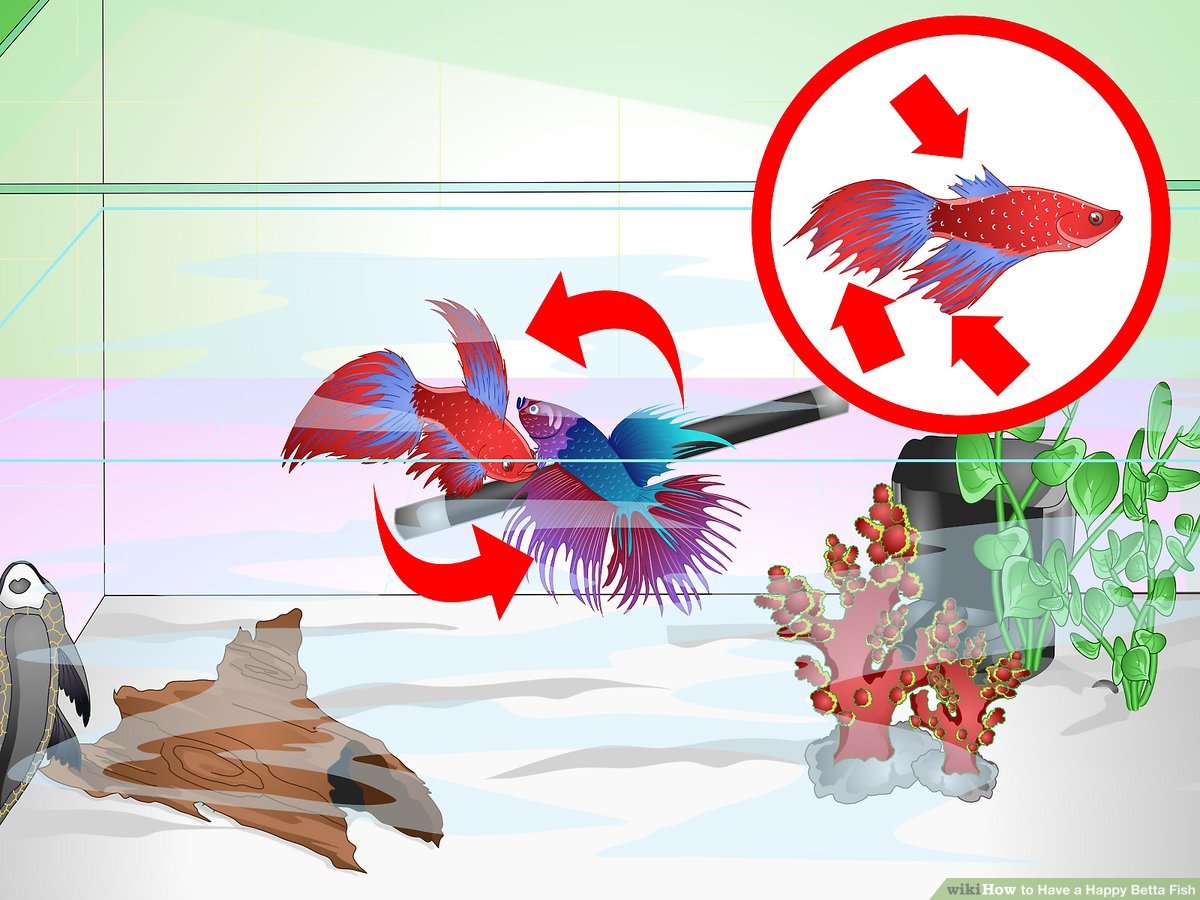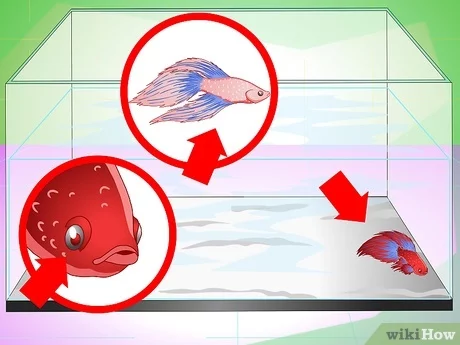Betta fish are beautiful and fascinating creatures to have as pets. They are known for their vibrant colors and unique personalities. If you are a betta fish owner, you may be wondering if your fish is happy and healthy. In this article, we will discuss the signs that indicate your betta fish is happy and thriving in its environment.
As a responsible pet owner, it is important to ensure that your betta fish is living in a comfortable and stress-free environment. By understanding your betta fish’s behavior and needs, you can monitor their well-being and take appropriate actions to keep them happy and healthy. So, let’s dive into the world of betta fish and learn how to tell if your fish is happy!
- Observe the fish’s behavior: Happy betta fish are active and curious. They will swim around their tank and explore their surroundings.
- Check the color of the fish: If your betta fish has bright and vibrant colors, it’s a sign of good health and happiness.
- Look for signs of stress: A stressed betta fish may be lethargic, have clamped fins, or hide in corners.
- Ensure the tank conditions are optimal: A clean and properly maintained tank with the right temperature and water parameters will keep your betta fish healthy and happy.

How to Tell if My Betta Fish is Happy?
Betta fish, also known as Siamese fighting fish, are popular pets due to their vibrant colors and unique personalities. As a betta fish owner, it is important to ensure that your fish is happy and healthy. But how can you tell if your betta fish is happy? Here are some signs to look out for:
Active and Energetic
A happy betta fish will be active and energetic. They will swim around their tank, explore their surroundings, and may even interact with you. If your betta fish is lethargic and spends most of its time hiding or sitting at the bottom of the tank, it may be a sign of an unhappy or sick fish.
To keep your betta fish active and energetic, ensure that they have enough space to swim around in their tank. The recommended tank size for a single betta fish is at least 5 gallons. Also, provide them with plenty of hiding spots and decorations to explore.
Appetite
A healthy betta fish will have a good appetite and will eagerly eat when given food. If your betta fish is not eating or is only eating a small amount, it may be a sign of a health issue or stress.
Ensure that you are feeding your betta fish the right type and amount of food. Betta fish are carnivores and require a high-protein diet. Overfeeding can also lead to health issues, so make sure to feed your betta fish the recommended amount of food daily.
Color
A happy betta fish will display vibrant colors. If your betta fish is pale or has dull colors, it may be a sign of stress or illness.
Ensure that your betta fish is in a suitable environment with a comfortable temperature, clean water, and plenty of hiding spots. Stress can cause betta fish to lose their color, so it is important to minimize stressors in their environment.
Fins
A happy betta fish will have healthy, intact fins. If your betta fish’s fins are torn or ragged, it may be a sign of stress or illness.
Ensure that your betta fish’s environment is free of sharp edges or decorations that can tear their fins. Also, make sure that the water in their tank is clean and properly filtered to prevent infections.
Bubble Nest
Male betta fish build bubble nests as a sign of happiness and readiness to breed. If your male betta fish has built a bubble nest, it is a good sign that they are happy and healthy.
However, bubble nests can also be built due to stress or environmental factors. Ensure that your betta fish’s environment is suitable and stress-free to ensure that the bubble nest is a sign of happiness.
Behavior
A happy betta fish will display curious and playful behavior. They may follow your finger or interact with decorations in their tank. If your betta fish is displaying aggressive or lethargic behavior, it may be a sign of stress or illness.
Ensure that your betta fish’s environment is suitable and stress-free. Also, make sure that they have enough space to swim around and explore their surroundings.
Breathing
A happy betta fish will breathe normally and steadily. If your betta fish is gasping for air or breathing rapidly, it may be a sign of a health issue or poor water quality.
Ensure that the water in your betta fish’s tank is clean and properly filtered. Also, make sure that the temperature and oxygen levels in the water are suitable for your betta fish.
Vs
To summarize, a happy betta fish will display active and energetic behavior, have a good appetite, display vibrant colors, have healthy fins, build bubble nests, display curious and playful behavior, and breathe normally. If you notice any signs of stress or illness in your betta fish, it is important to take action immediately to ensure their health and happiness.
Benefits
Keeping your betta fish happy and healthy not only benefits them but also benefits you as a pet owner. A happy betta fish will provide you with hours of entertainment and companionship. Additionally, a healthy betta fish will be less prone to illness and require less veterinary care, saving you money in the long run.
In conclusion, by observing your betta fish’s behavior and environment, you can tell if they are happy and healthy. Ensure that your betta fish has a suitable environment with clean water, proper filtration, and plenty of hiding spots and decorations. With proper care and attention, your betta fish can live a happy and healthy life.
Frequently Asked Questions
How can I tell if my betta fish is happy?
Betta fish are known for their unique personalities and behaviors. When your betta fish is happy, they will exhibit several signs of good health and a comfortable environment. One of the most obvious signs of a happy betta fish is their vibrant color. If your betta’s colors are bright and shiny, it’s a good indication that they are happy and healthy.
Another sign of a happy betta fish is their activity level. A happy betta fish will be active and curious, exploring their surroundings and swimming around their tank. They may even swim up to greet you when you approach their tank. If your betta fish is lethargic or spends most of their time hiding, it may be a sign that they are unhappy or stressed.
What kind of environment do betta fish need to be happy?
Creating the right environment is crucial to keeping your betta fish happy and healthy. Bettas are tropical fish and require warm water temperatures between 76 and 82 degrees Fahrenheit. They also need plenty of space to swim around, so a tank that is at least 5 gallons in size is recommended.
Bettas are also known for their love of hiding places, so adding plants, rocks, and other decorations to their tank can help them feel secure and comfortable. Just be sure to choose decorations that won’t harm your betta fish or damage their delicate fins.
How often should I feed my betta fish?
Overfeeding is a common problem with betta fish, which can lead to health problems and a shorter lifespan. As a general rule, betta fish should be fed once a day, with only a few pellets of high-quality betta fish food. If you notice your betta fish becoming overweight or sluggish, you may need to cut back on their food or switch to a different type of food.
It’s also important to avoid feeding your betta fish human food or treats, as these can be harmful to their digestive system. Stick to feeding them the recommended amount of betta fish food, and be sure to remove any uneaten food from their tank to prevent water pollution.
Do betta fish need a filter in their tank?
A filter is an essential component of any betta fish tank, as it helps to keep the water clean and healthy for your fish. The filter helps to remove any waste or debris from the water, which can help to prevent harmful bacteria from growing in your betta’s tank.
There are many different types of filters available for betta fish tanks, including sponge filters, hang-on-back filters, and canister filters. Be sure to choose a filter that is appropriately sized for your tank, and follow the manufacturer’s instructions for installation and maintenance.
Can betta fish live with other fish?
Betta fish are known for their aggressive behavior, especially towards other male bettas. If you are considering adding other fish to your betta’s tank, it’s important to choose fish that are compatible with bettas and won’t pose a threat to their wellbeing.
Some good options for tank mates include snails, shrimp, and certain types of small fish, such as neon tetras or guppies. However, it’s important to research any potential tank mates thoroughly before adding them to your betta’s tank, and to monitor their behavior closely to ensure that they are not causing any stress or aggression towards your betta fish.

10 Signs of Happy Betta fish
In conclusion, keeping a Betta fish happy is not rocket science. By providing a clean habitat, a well-balanced diet, and some entertainment, you can ensure that your fish is content and healthy. Remember to monitor your Betta’s behavior for any signs of stress or discomfort, and make adjustments to their environment as needed.
It is important to note that every Betta fish is different and may have unique preferences. Some may enjoy more plants in their tank, while others may prefer more hiding spaces. By observing your fish’s behavior and making adjustments accordingly, you can create a personalized and comfortable environment that will keep your Betta happy for years to come.
Overall, a happy Betta fish is a healthy Betta fish. By following the tips outlined in this article, you can ensure that your fish is thriving in its environment and living its best life. So go ahead and spoil your Betta with some new toys or a few extra plants – your fish will thank you for it!
